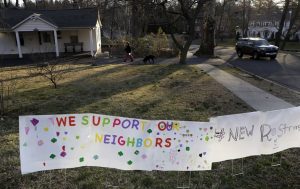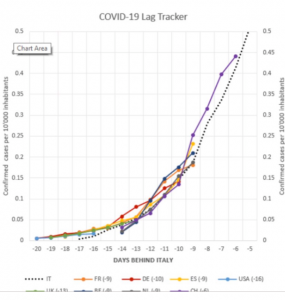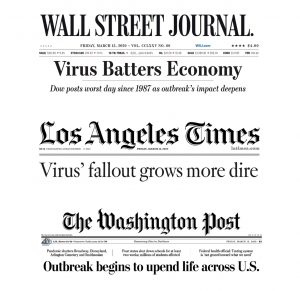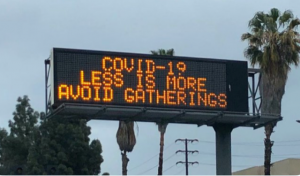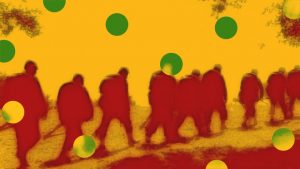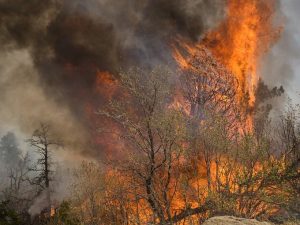Italy COVID-19
‘Dear neighbors…’
March 14, 2020Don’t forget: disasters and crises bring out the best in people
Rutger Bregman
“Dear neighbours. If you’re over 65 and your immune system is weak, I’d like to help you. Since I’m not in the risk group, I can help you in the coming weeks by doing chores or running errands. If you need help, leave a message by the door with your phone number. Together, we can make it through anything. You’re not alone!”
“We’ve learned how to accept help from others,” writes a woman living in Wuhan.“Because of this quarantine, we have bonded with and supported each other in ways that I’ve never experienced in nine years of living here.” Millions of Chinese people are encouraging each other to stand strong, using the Cantonese expression “jiayou” (“don’t give up”). YouTube videos show people in Wuhan singing from the windows of their homes, joined by numerous neighbours nearby, their voices rising in chorus and echoing amongst the soaring towers of Chinese cities. In Siena and Naples, both on complete lockdown, people are singing together from the balconies of their homes.
Children in Italy are writing “andrà tutto bene” (“everything will be all right”) on streets and walls, while countless neighbours are helping each other. On Thursday, an Italian journalist told the Guardian about what he had witnessed with his own eyes: “After a moment of panic in the population, there is now a new solidarity. In my community the drugstores bring groceries to people’s homes, and there is a group of volunteers that visit houses of people over 65.” A tour guide from Venice notes: “It’s human to be scared, but I don’t see panicking, nor acts of selfishness.”
The words “andrà tutto bene” – everything will be all right – were first used by a few mothers from the province of Puglia, who posted the slogan on Facebook. From there, it spread across the country, going viral almost as fast as the pandemic. The coronavirus isn’t the only contagion – kindness, hope and charity are spreading too.
As a species of animal that evolved to make connections and work together, it feels strange to suppress our desire for contact. People enjoy touching each other, and find joy in seeing each other in person – but now we have to keep our physical distance.
Still, I believe we can grow closer in the end, finding each other in this crisis. As Giuseppe Conte, the Italian prime minister, said this week: “Let’s distance ourselves from each other today so that we can embrace each other more warmly […] tomorrow.”
The pandemic has exposed how interconnected and interdependent we are as humans. Everyday practices, like handwashing and covering our sneezes, have become the most basic duty we owe to friends and strangers alike. And we’re finding thoughtful ways to care for another amidst the tumult.
Kristin Lin
Editor, The On Being Project
“Hope, for me, just means … coming to terms with the fact that we don’t know what will happen and that there’s maybe room for us to intervene.”
~Rebecca Solnit
“Great literature will come from this. Great art will come from this. Great awareness will come from this. Great love will come from this. More than anything else, great people will come from this – if we allow it to expand our hearts and minds.”
~Marianne Williamson
Seattle Times
Naomi Ishisaka
‘In the days since the Seattle area became the epicenter of the outbreak, the outpouring of support has been moving and inspiring. On an individual level, people have offered free babysitting, cooking and food delivery for harried parents and medically vulnerable older adults.
After racist coronavirus fears drove down business in Seattle’s Chinatown International District, Bill Tashima, a board member for the local Japanese American Citizens League, created a Facebook group on Sunday to share ways to support small restaurants. Within days, the group had nearly 5,000 members, sharing ideas for restaurant takeout to boost business in the struggling district and creating a virtual “tip jar” that one member was using to collect donations for restaurant workers.
The artistic community, which already experiences economic insecurity in good times due to unpredictable contract-based work, saw all public events canceled like dominoes in the past week. Seattle-area author Ijeoma Oluo quickly set up a GoFundMe on Monday to raise and distribute funds for artists. Within days, the fund raised $80,000 and distributed $10,000 and was in the process of distributing another $30,000 to artists directly impacted by loss of income due to the coronavirus. Another group of people started a live-performance streaming site on Facebook called “The Quarantine Sessions,” where artists can perform and the audience can tip the band before their performance starts.
To support those who are most vulnerable in an emergency, a grassroots effort formed in Seattle called “Covid19MutualAid,” centered on people with disabilities, people of color, undocumented people, older adults and others. In addition to recruiting volunteers for direct support such as food and grocery deliveries, the group is also advocating for systemic changes that would make communities less vulnerable in the first place.
When Seattle Public Schools announced Wednesday they would be closing abruptly the next day, people across the city jumped into action, knowing that for the 32% of Seattle school district families that are low income, school lunches are a critical part of how children stay fed. Volunteers and staff distributed school lunches for pickup at Highland Park Elementary in West Seattle on Thursday and in Rainier Beach, Washington Building Leaders of Change or WA-BLOC and food justice organization FEEST planned a free hot lunch called “Feed the Beach” for families on Friday with additional lunches twice a week after that.
These are just a few of the many grassroots efforts that are just getting started in our region. Larger entities like the Seattle Foundation are also taking action, with rapid response resources like the COVID-19 Response Fund quadrupling to $9 million in a few days.
The coming months will challenge us in ways we have never before imagined. But if we continue, as writer Sonya Renee Taylor said, to “put radical love into practice,” we might emerge stronger than we began.’
______
Editor’s note: The spread of novel coronavirus has left the state of Washington in a state of uncertainty. But amid the growing pandemic, members of the community have shown remarkable acts of kindness and efforts to take care of each other. From crowdsourced relief funds for local artists, to readers sending our own newsroom pizza after a long day, many people are rising to the occasion to uplift one another.
Boston Globe
Mattia Ferraresi is a writer for the Italian newspaper Il Foglio.
A message from Italy
‘So here’s my warning for the United States: It didn’t have to come to this.
We of course couldn’t stop the emergence of a previously unknown and deadly virus. But we could have mitigated the situation we are now in, in which people who could have been saved are dying. I, and too many others, could have taken a simple yet morally loaded action: We could have stayed home.
What has happened in Italy shows that less-than-urgent appeals to the public by the government to slightly change habits regarding social interactions aren’t enough when the terrible outcomes they are designed to prevent are not yet apparent; when they become evident, it’s generally too late to act. I and many other Italians just didn’t see the need to change our routines for a threat we could not see.
Italy has now been in lockdown since March 9; it took weeks after the virus first appeared here to realize that severe measures were absolutely necessary.
According to several data scientists, Italy is about 10 days ahead of Spain, Germany, and France in the epidemic progression, and 13 to 16 days ahead of the United Kingdom and the United States. That means those countries have the opportunity to take measures that today may look excessive and disproportionate, yet from the future, where I am now, are perfectly rational in order to avoid a health care system collapse. The United States has some 45,000 ICU beds, and even in a moderate outbreak scenario, some 200,000 Americans will need intensive care.
The way to avoid or mitigate all this in the United States and elsewhere is to do something similar to what Italy, Denmark, and Finland are doing now, but without wasting the few, messy weeks in which we thought a few local lockdowns, canceling public gatherings, and warmly encouraging working from home would be enough stop the spread of the virus. We now know that wasn’t nearly enough.
Life in lockdown is hard, but it is also an exercise in humility. Our collective well-being makes our little individual wishes look a bit whimsical and small-minded. My wife and I work from home, or at least we try to. We help the kids with their homework, following the instructions their teachers send every morning via voice messages and video, in a moving attempt to keep alive their relationships with their students.
Strangely, it’s also a moment in which our usual individualistic, self-centered outlook is waning a bit. In the end, each of us is giving up our individual freedom in order to protect everybody, especially the sick and the elderly. When everybody’s health is at stake, true freedom is to follow instructions.’
NYTimes
Eric Klinenberg, NYU Social Sciences Professor
‘It’s an open question whether Americans have enough social solidarity to stave off the worst possibilities of the coronavirus pandemic. There’s ample reason to be skeptical. We’re politically divided, socially fragmented, skeptical of one another’s basic facts and news sources. The federal government has failed to prepare for the crisis. The president and his staff have repeatedly dissembled about the mounting dangers to our health and security. Distrust and confusion are rampant. In this context, people take extreme measures to protect themselves and their families. Concern for the common good diminishes. We put ourselves, not America, first.
But crises can be switching points for states and societies, and the coronavirus pandemic could well be the moment when the United States rediscovers its better, collective self. Ordinary Americans, regardless of age or party, already have abundant will to promote public health and protect the most vulnerable. Although only a fraction of us are old, sick or fragile, nearly all of us love and care for someone who is.
Today Americans everywhere are worried about the fate of friends and family members. Without stronger solidarity and better leadership, though, millions of our neighbors may not get the support they need.
We’re not likely to get better leadership from the Trump administration, but there’s a lot we can do to build social solidarity. Develop lists of local volunteers who can contact vulnerable neighbors. Provide them companionship. Help them order food and medications. Recruit teenagers and college students to teach digital communications skills to older people with distant relatives and to deliver groceries to those too weak or anxious to shop. Call the nearest homeless shelter or food pantry and ask if it needs anything.
Why not begin right now?’
‘If you’re like me and worried about your favorite local businesses right now, buy their gift certificates. It will help with their immediate liquidity needs and you can use it later once we’re past this.’
CANTICLE 6
by May Sarton
Alone one is never lonely: the spirit
adventures, waking
In a quiet garden, in a cool house, abiding single there;
The spirit adventures in sleep, the sweet thirst-slaking
When only the moon’s reflection touches the wild hair.
There is no place more intimate than the spirit alone:
It finds a lovely certainty in the evening and the morning.
It is only where two have come together bone against bone
That those alonenesses take place, when, without warning
The sky opens over their heads to an infinite hole in space;
It is only turning at night to a lover that one learns
He is set apart like a star forever and that sleeping face
(For whom the heart has cried, for whom the frail hand burns)
Is swung out in the night alone, so luminous and still,
The waking spirit attends, the loving spirit gazes
Without communion, without touch, and comes to know at last
Out of a silence only and never when the body blazes
That love is present, that always burns alone, however steadfast.
Last night I watched a documentary on war,
and the part I carry with me today
was the spectacle of a line
of maybe 20 blinded soldiers
being led, single-file,
away from a yellow cloud of gas.
That must be what accounts
for this morning’s brightness—
sunlight slathered over everything
from the royal palms to the store awnings,
from the blue Corolla at the curb
to a purple flower climbing a fence,
one gift of sight after another.
I couldn’t see their bandaged faces,
but each man had one hand
resting on the shoulder
of the man in front of him
so that every man was guiding
and being guided at the same time,
and in the same tempo,
given the unison of their small, cautious steps.
~Billy Collins
Fire activity picked up across the United States this week. 45 new large fires were reported most of them in Oklahoma. Get more information a
